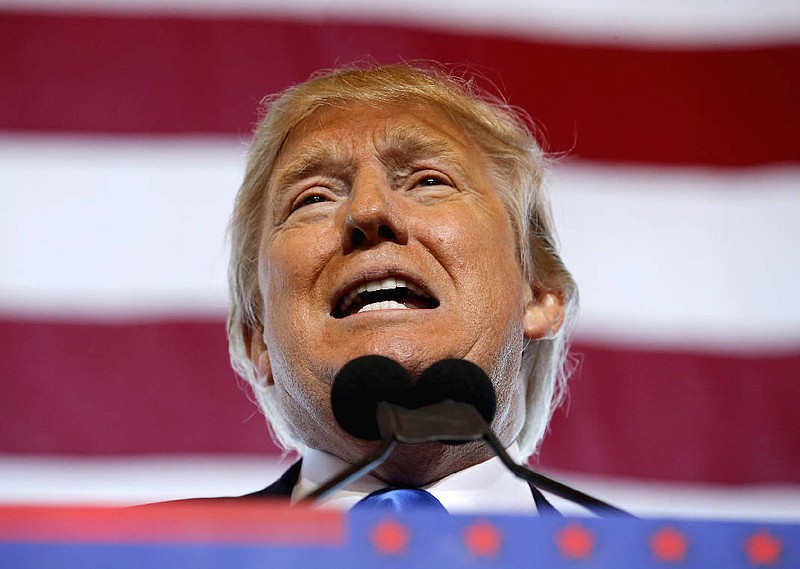One thing's for sure about the general election in Tennessee next November: Neither Donald Trump nor Ben Carson will be running as an independent candidate for president.
State election officials finalized the ballot Thursday for the presidential primary on March 1, and with it is the provision that whatever party you're running on in the primary is the one you're stuck with for the general election.
"We have what's commonly referred to as a 'sore loser' provision," Tennessee Secretary of State Tre Hargett told WPLN in Nashville. "Anybody that's on the ballot will not be eligible to run under any other banner."
Both Trump and Carson have made noises about running as independents if they don't win the Republican nomination. Trump said during this week's CNN Republican debate that he wouldn't run as an independent, but Carson demurred. Sen. Bernie Sanders, D-Vt., who has appealed to Democratic voters who aren't comfortable with ethically challenged Hillary Clinton, also has ruled out a third-party try.
The high-stakes states of Ohio and Michigan, plus South Carolina, have similar rules in which those candidates who lose in the primary can't turn around and make runs as independents.
The Tennessee ballot also certified at-large and congressional district delegates - both uncommitted and committed to a particular candidate - to the Republican National Convention.
A number of them are state legislators, including, for Florida Sen. Marco Rubio, House Republican Leader Gerald McCormick of Chattanooga, Reps. Dan Howell of Cleveland, Eddie Smith of Knoxville and Ron Travis of Kingston, and Sens. Brian Kelsey of Germantown and Becky Massey of Knoxville; for Texas Sen. Ted Cruz, Reps. Judd Matheny of Tullahoma, Jason Zachary of Knoxville, Sheila Butt of Columbia, Jerry Sexton of Bean Station and Dennis Powers of Jacksboro; for former Arkansas Gov. Mike Huckabee, Reps. Cameron Sexton of Crossville and Barry Doss of Leoma, plus Sen. Ed Jackson of Jackson; and for businessman Donald Trump, Sens. Mae Beavers of Mount Juliet and Senate Republican Caucus Chairman Bill Ketron of Murfreesboro.
No legislator filed to run as a delegate for former Florida Gov. Jeb Bush, but former Tennessee U.S. Sen. Bill Frist did, along with current Tennessee Economic and Community Development Commissioner Randy Boyd (who also is reported to have contributed to Carly Fiorina's campaign), and his predecessor, Bill Hagerty.
Among other prominent names on the delegate list are CBL & Associates Vice President Michael Lebovitz (Bush), former Greater Chattanooga Chamber of Commerce executive Hayes Ledford (Bush), former Tennessee Valley Authority board member Susan Richardson Williams (Bush), former state Rep. Joe Carr (Cruz), former prominent radio talk show host Steve Gill (Cruz), Chattanooga Tea Party President Mark West (Cruz), former U.S. Rep. Chuck Fleischmann aide Chip Saltsman (Huckabee), Bradley County Sheriff Eric Watson (Huckabee), former Knoxville Mayor and former Bush supporter Victor Ashe (Rubio), former Hamilton County School Board candidate Oscar Brock (Rubio), Hamilton County Commissioner Randy Fairbanks (Rubio), former Bradley County Commissioner J. Adam Lowe (Rubio), former U.S. Rep. Zach Wamp (Rubio), former state Rep. Bobby Wood (Rubio), former state Sen. Stacey Campfield (Trump), former Knox County Sheriff Tim Hutchison (Trump), and Yessicks Design Center owner Marsha Yessick (Trump).
In the March election, at least in the Republican primary, voters will be able to vote for the presidential candidate of their choice and, according to the Tennessee Secretary of State's office, "vote for as many candidates as there are to be delegates from that congressional district. According to the number allocated for any presidential candidate, the delegate candidate(s) receiving the most votes shall be certified as the delegates to their parties' national conventions."
So voters could vote for various people they know and admire and who may be supporting different candidates, or they could vote only for delegates supporting the candidate they prefer.
Tennessee will have 58 delegates to the Republican National Convention in Cleveland, Ohio. Of those, 27 district delegates (three from each of the nine congressional districts) will be allocated based on the primary results in each district. The 28 at-large delegates (from any part of the state) are bound to presidential contenders based on the primary results statewide. Three party leaders, the national committeeman, the national committeewoman and the chairperson of the state Republican Party, attend the convention as unpledged delegates.
Once at the national convention, state delegates are bound to their votes for at least two ballots.
Unlike Republicans, whose delegates are chosen by popular election, Democratic presidential delegates are decided by party rules.
